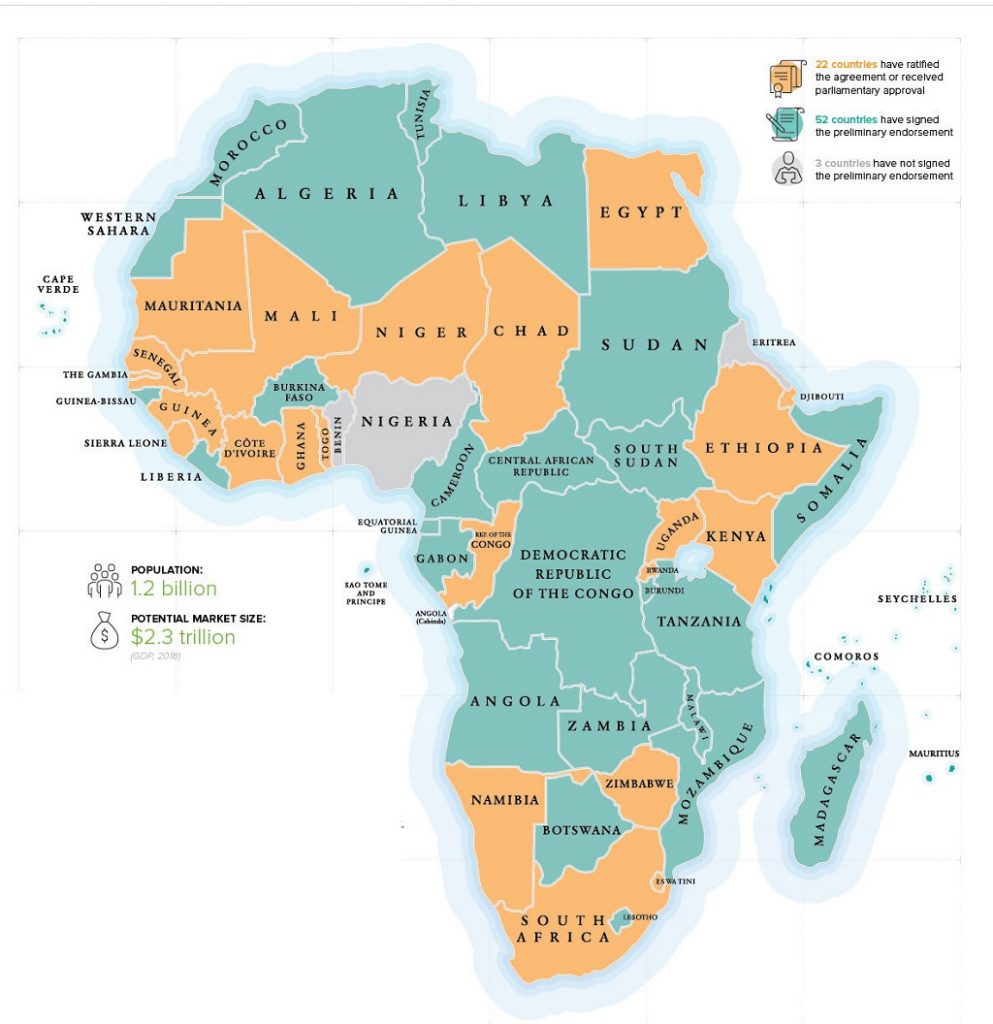With the AfCFTA expected to increase intra-African trade by 52 per cent by the year 2022, the journey towards making it a reality is in high gear.
The Africa Continental Free Trade Agreement seeks to have the removal of tariffs on 90 per cent of goods traded within the continent.
Towards this, UNCTAD and the African Union have developed an online platform to help remove non-tariff barriers to trade in Africa. The tool became operational on January 13.
Moving goods across the continent
Traders and businesses moving goods across the continent can now instantly report the challenges they encounter, such as quotas, excessive import documents or unjustified packaging requirements.
To improve the movement of goods across the continent and reduce the cost importers and exporters in the region face, the tool will help African governments monitor and eliminate such challenges which slow trade costing the continent billions of dollars annually.
The African Union’s Agenda 2063 seeks to transform Africa into a global powerhouse of the future. The need to envision a long-term 50-year development trajectory for Africa is important as the continent needs to revise and adapt its development agenda due to ongoing structural transformations; increased peace and reduction in the number of conflicts; renewed economic growth and social progress; the need for people-centred development, gender equality and youth empowerment; changing global contexts such as increased globalization and the ICT revolution; the increased unity of Africa which makes it a global power to be reckoned with and capable of rallying support around its own common agenda; and emerging development and investment opportunities in areas such as agri-business, infrastructure development, health and education as well as the value addition in African commodities.
With the prospects getting ever so real, a report by UNCTAD shows that African countries could gain US$20 billion each year by tackling barriers to trade at the continental level. This is so much more than the US$3.6 billion they could pick up by eliminating tariffs.
“Non-tariff barriers are the main obstacles to trade between African countries,” said Pamela Coke-Hamilton, director of UNCTAD’s trade division.
“That’s why the success of the African Continental Free Trade Area depends in part on how well governments can track and remove them,” she said.
The AfCFTA, which entered into force in May 2019, is expected to boost intra-African trade, which at 16 per cent is low compared to other regional blocs. For example, 68 per cent of the European Union’s trade take place among EU nations. For the Asian region, the share is 60 per cent.
AfCFTA requires member countries to remove tariffs on 90 per cent of goods. But negotiators realized that non-tariff barriers must also be addressed and called for a reporting, monitoring and elimination mechanism.
A statement from UNCTAD notes that the online platform built by UNCTAD and the African Union is a direct response to that demand.
Logging and responding to complaints
Complaints logged on the platform will be monitored by government officials in each nation and a special coordination unit that is housed in the AfCFTA secretariat.
The unit will be responsible for verifying a complaint. Once verified, officials in the countries concerned will be tasked with addressing the issue within set timelines prescribed by the AfCFTA agreement.
UNCTAD and the African Union trained 60 public officials and business representatives from across Africa on how to use the tool in December 2019 in Nairobi, Kenya.
They practised logging and responding to complaints, in addition to learning more about non-tariff barriers and their effects on trade and business opportunities.
“The AfCFTA non-tariff barriers mechanism is a transparent tool that will help small businesses reach African markets,” said Ndah Ali Abu, a senior official at Nigeria’s trade ministry, who will manage complaints concerning Africa’s largest economy.
Justin Bayili, a business representative who heads the Ghana-based Borderless Alliance, agreed. “The online tool will play a key role in helping my organization effectively and efficiently tackle the challenges faced by the companies we represent,” he said.
UNCTAD and the African Union first presented tradebarriers.africa in July 2019 during the launch of the AfCFTA’s operational phase at the 12th African Union Extraordinary Summit in Niamey, Niger.
Following the official presentation, they conducted multiple simulation exercises with business and government representatives to identify any possible operational challenges.
Harmonising Africa’s myriad languages
One of the challenges was linguistic. Africa is home to more than 1,000 languages. So the person who logs a complaint may speak a different language from the official in charge of dealing with the issue.
Such would be the case, for example, if an English-speaking truck driver from Ghana logged a complaint about the number of import documents required to deliver Ghanaian cocoa to importers in Togo – a complaint that would be sent to French-speaking Togolese officials.
“For the online tool to be effective, communication must be instantaneous,” said Christian Knebel, a UNCTAD economist working on the project.
The solution, he said, was to add a plug-in to the online platform that automatically translates between Arabic, English, French, Portuguese and Swahili – languages that are widely spoken across the continent. More languages are being added.
UNCTAD’s work on the AfCFTA non-tariff barriers mechanism is funded by the German government.
